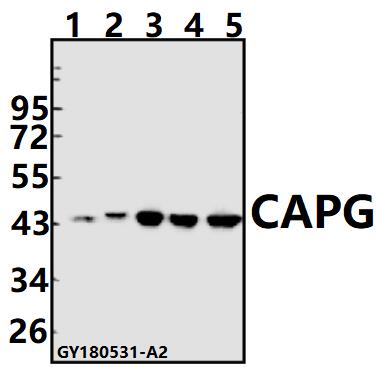Product Name :
CAPG polyclonal antibody Background :
Caldesmon, Filamin 1, Nebulin, Plastin, ADF, Gelsolin, CapG, Dematin and Cofilin are differentially expressed Actin-binding proteins. Both muscular (CDh) and non-muscular (CD1) forms of Caldesmon bind to Actin as well as to Calmodulin and Myosin. CDh is expressed predominantly on thin filaments in smooth muscle, whereas CD1 is widely expressed in non-muscle tissues and cells. CapG, also designated Actin-regulatory protein and macrophage-capping protein, is a macrophage-specific protein that reversibly blocks the barbed ends of Actin filaments, but does not sever preformed ones. The interactions of CapG with Actin may be important in the regulation of nuclear and cytoplasmic structures. CapG is a calcium-sensitive DNA-binding protein that plays a role in macrophage function. It is expressed in macrophages and macrophage-like cells and can localize both to the nucleus and the cytoplasm. Product :
Rabbit IgG, 1mg/ml in PBS with 0.02% sodium azide, 50% glycerol, pH7.2 Storage&Stability :
Store at 4°C short term. Aliquot and store at -20°C long term. Avoid freeze-thaw cycles. Specificity :
CAPG polyclonal antibody detects endogenous levels of CAPG protein. Immunogen :
Recombinant fragment corresponding to a region within amino acids 62-349 of Human CAPG. Conjugate :
Unconjugated Modification :
Unmodification
CAPG polyclonal antibody Background :
Caldesmon, Filamin 1, Nebulin, Plastin, ADF, Gelsolin, CapG, Dematin and Cofilin are differentially expressed Actin-binding proteins. Both muscular (CDh) and non-muscular (CD1) forms of Caldesmon bind to Actin as well as to Calmodulin and Myosin. CDh is expressed predominantly on thin filaments in smooth muscle, whereas CD1 is widely expressed in non-muscle tissues and cells. CapG, also designated Actin-regulatory protein and macrophage-capping protein, is a macrophage-specific protein that reversibly blocks the barbed ends of Actin filaments, but does not sever preformed ones. The interactions of CapG with Actin may be important in the regulation of nuclear and cytoplasmic structures. CapG is a calcium-sensitive DNA-binding protein that plays a role in macrophage function. It is expressed in macrophages and macrophage-like cells and can localize both to the nucleus and the cytoplasm. Product :
Rabbit IgG, 1mg/ml in PBS with 0.02% sodium azide, 50% glycerol, pH7.2 Storage&Stability :
Store at 4°C short term. Aliquot and store at -20°C long term. Avoid freeze-thaw cycles. Specificity :
CAPG polyclonal antibody detects endogenous levels of CAPG protein. Immunogen :
Recombinant fragment corresponding to a region within amino acids 62-349 of Human CAPG. Conjugate :
Unconjugated Modification :
Unmodification
-
 Western blot (WB) analysis of CAPG pAb at 1:500 dilution Lane1:The Lung tissue lysate of Mouse(40ug) Lane2:The Lung tissue lysate of Rat(40ug) Lane3:A549 whole cell lysate(40ug) Lane4:H1792 whole cell lysate(40ug) Lane5:A375 whole cell lysate(40ug)
Western blot (WB) analysis of CAPG pAb at 1:500 dilution Lane1:The Lung tissue lysate of Mouse(40ug) Lane2:The Lung tissue lysate of Rat(40ug) Lane3:A549 whole cell lysate(40ug) Lane4:H1792 whole cell lysate(40ug) Lane5:A375 whole cell lysate(40ug)
Bioworld Biotech only provide peptides for our antibodies and do not provide additional peptide customization services.
Price/Size :
USD 368/1mg/vial
Tips:
For phospho antibody, we provide phospho peptide(0.5mg) and non-phospho peptide(0.5mg).Describe :
Blocking peptides are peptides that bind specifically to the target antibody and block antibody binding. These peptide usually contains the epitope recognized by the antibody. Antibodies bound to the blocking peptide no longer bind to the epitope on the target protein. This mechanism is useful when non-specific binding is an issue, for example, in Western blotting (WB) and Immunohistochemistry (IHC). By comparing the staining from the blocked antibody versus the antibody alone, one can see which staining is specific; Specific binding will be absent from the western blot or IHC performed with the neutralized antibody.Formula:
Synthetic peptide was lyophilized with 100% acetonitrile and is supplied as a powder. Reconstitute with 0.1 ml DI water for a final concentration of 10 mg/ml.The purity is >90%,tested by HPLC and MS.
Storage:
The freeze-dried powder is more stable. For short time at 2-8°C. For long term storage store at -20°C.
Note :
This product is for research use only (RUO only). Not for use in diagnostic or therapeutic procedures.
 CAPG polyclonal antibody
CAPG polyclonal antibody  Datasheet
Datasheet COA
COA MSDS
MSDS SHIP
SHIP